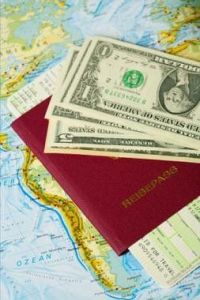Top 5 Tips On Travel Money
Posted by: kirsty_wilson in Travel Tips, tags: Currencies, Money, Travel TipsSo, you want to get the best deal on your travel money and ensure your money is safe and working hard for you whilst abroad? Holidays are expensive enough as it is so it makes sense to take some precautions and do a little planning when it comes to exchanging, carrying and spending your cash abroad.
 1. Take A Combination Of Cash And Cards
1. Take A Combination Of Cash And Cards
When travelling to foreign climes, it’s a good idea to take a mixture of foreign currency and debit and credit cards so that you are prepared for all possibilities. For example, some vendors abroad may not accept cards or you might not have enough cash to cover that big shopping purchase.
Take care with your cards and inform your bank that you are travelling in case they put a stop on your card whilst abroad. Take photocopies of your cards and keep your provider’s emergency number safe in case you lose your card or have your personal belongings stolen.
2. Remember The Exchange Rate!
Many people don’t take a second glance at the exchange rate when changing their money and certainly many don’t think of comparing exchange rates before they travel. But in doing so, you could save yourself a significant amount of money especially if you plan to change up large sums. Most foreign exchange companies today offer 0% commission deals so ignore this – it’s really not that important. What is important is the actual exchange rate you are being offered.
If you are thinking of exchanging money at your bank you might want to think again. Their exchange rate might be up to 5% different to that of a foreign exchange broker who has access to live market rates.
3. Put Your Kids On A Leash!
When you’re travelling with kids, holiday expenses can really spiral out of control! Those snacks, souvenirs, inflatables for the pool and fairground rides can eat into your budget really quickly. To keep a tight rein on your holiday budget, why not consider giving your children a set allowance each day? This will not only help you to keep your money in check but will also teach your children that money doesn’t grow on trees and that they need to budget too.
4. Pick A Card, But Not Just Any Card
On holiday it’s easy to forget about a budget and to be tempted by sheer overseas indulgence. And if you take a big arsenal of credit cards with you, you could end up spending more than you bargained for. There is no problem with spreading your spend when abroad as long as you can pay off the balance when you get back home. It’s also essential to check out the fees payable for international cash withdrawals or payments on your credit card. If you really want to take a credit card with you for those little luxuries, shop around for a 0% credit card and limit yourself to a budget that you can afford to pay back quickly when you get back. It won’t be a good feeling paying off a credit card bill for a holiday you had years ago!
5. Be A Savvy Duty Free Shopper
If you can’t ignore the lure of the duty free perfume, booze or tobacco, just be mindful that duty free stores are using a new trick to make more profits – giving you the option to pay for goods with your local currency. This might seem convenient for you but there’s a hefty conversion fee to consider – this could be as high as 3%. You’d be far better to pay for goods in any leftover currency you have or to use your debit card.
About the author: Born and raised in San Francisco, Aviva Tabachnik is the Head of Partnerships at MyTravelMoney, an OPP award winning travel comparison website. Aviva is a keen travel adventurist & semi professional dancer.


 Here, we consider several simple things you can do to make sure that your holiday isn’t ruined by financial worries.
Here, we consider several simple things you can do to make sure that your holiday isn’t ruined by financial worries.

 Entries (RSS)
Entries (RSS)